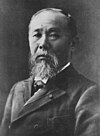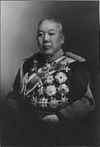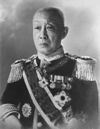Genrō
'original elder') was an unofficial designation given to a generation of elder Japanese statesmen, all born in the 1830s and 1840s, who served as informal extraconstitutional advisors to the emperor during the Meiji, Taishō, and early Shōwa eras of Japanese history.The institution of genrō originated with the traditional council of elders (Rōjū) common in the Edo period; however, the term genrō appears to have been coined by a newspaper only in 1892.Experienced leaders of the Meiji Restoration were singled out by the Emperor as genkun (元勲, lit.With the exception of Saionji Kinmochi, all the genrō were from medium or lower ranking samurai families, four each from Satsuma and Chōshū, the two former domains that had been instrumental in the overthrow of the former Tokugawa shogunate in the Boshin War of the Meiji Restoration of 1867–1868.The genrō had the right to select and nominate Prime Ministers to the Emperor for approval.










Nogi MaresukeJapanesestatesmenTaishōShōwaJapanese historyRōjūEdo periodGenrōinlegislative bodyMeiji RestorationEmperorSaionji KinmochisamuraiSatsumaChōshūTokugawa shogunateBoshin WarPrime MinistersMeiji oligarchyInoue KaoruItō HirobumiKatsura TarōKuroda KiyotakaMatsukata MasayoshiŌyama IwaoSaigō TsugumichiYamagata AritomoCouncil of Elders of the Bundestag (Germany)Privy councilGordon, AndrewJansen, Marius B.